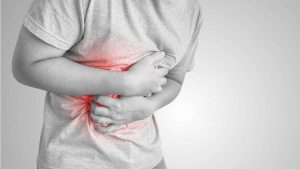
How does overeating negatively affect our body?
Our bodies function best when food is ingested in moderation. Overeating has two problems. Firstly, excessive food in the stomach increases the risk of belching and acid reflux. In individuals who have gastroesophageal reflux disease, overeating can aggravate their symptoms of heartburn and abdominal pain.
Secondly, overeating results in a surge in calories. Excess calories will be converted into fat and stored in the body, cumulating in weight gain and obesity. Excessive sugars will also stress the pancreas, an organ that produces insulin to control the glucose level in the body. Overeating for prolonged periods can lead to diabetes, obesity and metabolic complications such as high cholesterol levels.
Indigestion and Bloating
What happens in our body to cause indigestion and bloating?
Excessive food in the stomach can lead to a sensation of bloating. This is a result of the stomach stretching excessively because it is storing a large quantity of food. Distension of the stomach is perceived as bloating and indigestion.
Another reason is that certain foods are harder to digest. These foods belong to a group called the FODMAPs. It stands for fermentable oligo-, di-, mono-saccharides and polyols. It includes oligosaccharides (e.g. wheat, legumes, various fruits and vegetables), lactose, fructose in fruits and polyols (certain fruits, vegetables). When FODMAP foods are not digested properly, it can lead to abdominal pain, cramps and gas.
Acid Reflux
How can overeating cause or trigger acid reflux?

Our stomach can stretch to accommodate a finite amount of food and liquid. Eating beyond fullness (satiety) will increase the risk of acid reflux. When a person eats a meal, the acid that is produced in the stomach tends to accumulate on top of the food. When a person is positioned upright, the acid pocket lies near the top of the stomach. Overeating increases the chances of belching and this will expose the lower oesophagus (food pipe that connects the throat to the stomach) to the caustic effects of gastric acid.
Gastric acid can cause chemical injury to the upper abdomen or central lower chest. This burning sensation can even be mistaken as the chest pain of a heart attack. Reflux of acid and food occurs not only with big meals, but also when one lies down too soon after a meal. In general, lying down within 3 hours of a meal increases the risk of acid reflux.
Can such behaviour result in any long-term gastric problems?
Overeating can result in an increased risk of acid reflux. This is known as gastroesophageal reflux disease. When we swallow food, it passes from the esophagus (food pipe) into the stomach. At the entrance of the stomach lies a valve (lower esophageal sphincter), which opens and closes. Some individuals have a valve which is incompetent and loose. When the valve does not shut properly, overeating increases the risk of acid reflux.
Chronic exposure of the lower esophagus to acid can lead to ulcers and abdominal pain. After many years, repeated episodes of inflammation in the esophagus, will result in an increased risk of esophageal cancer. This condition is called Barrett’s esophagus.
Some people engage in an uncommon sport called competitive eating. This is a competition whereby individuals eat as much and as fast as possible within a short span of time. To train for this sport, individuals intentionally overeat and over distend their stomachs with the aim of accommodating even larger portions of food. Their stomachs will gradually increase in size to accommodate the increased portions of food. A postulated risk of overeating in this sport is developing a stomach that fails to contract properly. This condition is called gastroparesis and the stomach cannot evacuate its contents properly into the small intestine after a meal.
A Gastroenterologist's advice for good eating habits
Eat in moderation. This means having enough to experience a pleasant sense of fullness, without the bloating. Aim to have a balanced diet and do not neglect to take sufficient green vegetables.
Consider increasing one’s physical activity especially during festive seasons when binge eating may occur over several days. This will ensure that excessive calories are not accumulated in the body as fat. Balance out the total caloric intake over the day. If one has a heavier meal, balance it out with a lighter meal later in the day. There are many smartphone apps which can count calories and ensure that one does not overeat.





